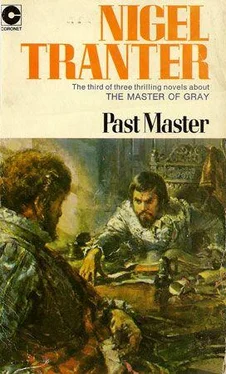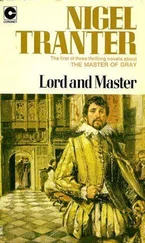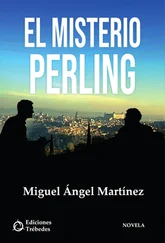Nigel Tranter - Past Master
Здесь есть возможность читать онлайн «Nigel Tranter - Past Master» весь текст электронной книги совершенно бесплатно (целиком полную версию без сокращений). В некоторых случаях можно слушать аудио, скачать через торрент в формате fb2 и присутствует краткое содержание. Жанр: Исторические приключения, на английском языке. Описание произведения, (предисловие) а так же отзывы посетителей доступны на портале библиотеки ЛибКат.
- Название:Past Master
- Автор:
- Жанр:
- Год:неизвестен
- ISBN:нет данных
- Рейтинг книги:5 / 5. Голосов: 1
-
Избранное:Добавить в избранное
- Отзывы:
-
Ваша оценка:
- 100
- 1
- 2
- 3
- 4
- 5
Past Master: краткое содержание, описание и аннотация
Предлагаем к чтению аннотацию, описание, краткое содержание или предисловие (зависит от того, что написал сам автор книги «Past Master»). Если вы не нашли необходимую информацию о книге — напишите в комментариях, мы постараемся отыскать её.
Past Master — читать онлайн бесплатно полную книгу (весь текст) целиком
Ниже представлен текст книги, разбитый по страницам. Система сохранения места последней прочитанной страницы, позволяет с удобством читать онлайн бесплатно книгу «Past Master», без необходимости каждый раз заново искать на чём Вы остановились. Поставьте закладку, и сможете в любой момент перейти на страницу, на которой закончили чтение.
Интервал:
Закладка:
Lachlan Mor was well satisfied. He turned his ship directly into the little bay beneath the high headland.
Skilfully steered and rowed, the leading galley gently grounded its forefoot on the shingle of the beach, and Sir Lachlan, despite his years and heavy chain-mail, was first over the side and into chest-high water. Ludovick could not do other than follow, gasping at the cold.
Soon armed men were streaming ashore by the hundred. All save a few of the galleys' fighting-men, as distinct from the oarsmen, were landed, to the number of some seven hundred. Sir Lachlan, with Hector Ruari and Ian Ban, Maclean of Tobermory and other notables, was already striding up the rugged hillside of the ridge which lay between them and Tobermory's bay. Ludovick was thankful for the exercise, at least, to set the blood flowing in his veins.
The galleys were still all lying huddled close in the inlet below, when the climbers neared the top of the ridge. Lachlan Barrach had been left in command of the ships.
Cautiously the Maclean leaders approached the crest, the main mass holding back. Utilising the rocks and bushes, they crept up, to peer over.
The basin of the bay of Tobermory was still half in shadow. It was large, as Maclean had said, fully a mile across, with fairly steep sides, heavily wooded, curving round to two headlands. Between these lay a long, low, green island, substantially blocking the entrance. To the south, the passage looked little wider than a river; to the north it might be four hundred yards, but was narrowed by a thrusting sand spit.
The entire area, land and water, presented a scene of activity this early morning. The bay itself was full of craft, mainly small but with two or three galleys and birlinns amongst them. There was much coming and going of rowing-boats out to these. On land there was considerable movement, mainly down to the shore. It looked as though camp was now being struck.
'Good! This is well!' Lachlan Mor declared. 'We shall leave them a little longer. There is no hurry now, at all, at all! Signal your brother to wait, Hector.'
The red-head slipped down below the skyline, to stand up and wave his plaid in the direction of the galleys below, a prearranged notification.
'You wait? For more men? Further aid?' Ludovick inquired.
'No. Not that. Clanranald has more men than I have, yes. I but wait for more of them to embark. So we shall lessen his advantage.'
They lay watching while the sun rose higher, and more and more of the MacDonalds transferred from the shore to the boats. Obviously they were not going to wait for the tide. As had been foretold, and as often happens, with daylight the night wind was dropping. At length Maclean was satisfied.
'Now!' he said. 'Sign him to start, Hector.'
Lachlan Barrach, below, was quick to recognise his brother's second signal. It was only a few moments before oar splashes could be seen, and the galleys began to move seawards.
As soon as he saw the leading vessel rounding the point of Rudha Seanach. with a bare mile to go to the south channel and Calve Island, Lachlan Mor rose to his feet, right on the skyline as he was. Reaching back over his shoulder, he drew the great two-handed sword strapped there in a single magnificent sweep, to hold it aloft.
'Brothers!' he shouted, in the Gaelic. 'Sons of Gillean! There is your prey. Come and kill!' And he flung the sword round in a flashing arc, to point northwards, downhill.
A roar rose from hundreds of throats, as the impatient multitude surged forward.
After that, as far as Ludovick was concerned, all was chaos and confusion, in an onset totally unlike anything he had experienced hitherto. In that yelling, shouting rush downhill he was quickly overtaken and passed by more enthusiastic and lighter-clad runners, broadswords held high – though even so, mail-clad as he was. Sir Lachlan with his vast strides kept the lead. No doubt the continuous shouting, since it was led by the chief, was more than just barbarous sound and fury, and intended to confuse the enemy as to numbers; it certainly had the effect of confusing the Duke, its rageful uproar preventing him from thinking, from using his brain coherently at all. It was only later that he could piece together the happenings of the next hour or so into any comparatively clear pattern.
Clanranald and the other leaders of the MacDonald host were still on shore when the Macleans appeared on the skyline to the south and came charging down upon them. With most of their men embarked, it was obviously their best policy to embark likewise, rather than to stand their ground. This they were proceeding to do when the topmasts of the galley fleet were perceived above the low sandhills and grass banks at the southern end of Calve Island, most evidently blocking the south channel. A general movement of boats towards the north channel followed, in consequence.
But it was too late. The Maclean galleys were there first, and all escape by sea was precluded. Clanranald's horns bugled the recall.
Getting his scattered host back to the shore again, however, and in fighting trim, was no easy task. It demanded time – and time was a commodity in short supply indeed that morning. Their numbers much masked by the woodland, but sounding a fearsome array, the Macleans bore down on the beach at a furious pace.
Clanranald could only turn now and face the onslaught as best he might, with a bare third of his force, hoping that others would reach him quickly. But this was to reckon without Lachlan Barrach. Only a comparatively few of the Maclean galleys were required to block the entrances to the bay; with the others, braving the hazards of navigation in the confined and shallow waters, he drove in and bore down upon the trapped craft, large and small, his cannon crashing out their dire contribution. The MacDonald boats darted hither and thither in complete disorder.
No real battle eventuated, however many minor skirmishes developed. The MacDonalds were brave and indeed terrible fighters, but in the circumstances they could make no coherent stand, no unified defence. In the face of Lachlan Mor's headlong charge, those around Clanranald were borne back, overwhelmed and driven into the sea.
Ludovick's own part in it all was scarcely glorious. By no means in the front rank of the Macleans, after having tripped over tree-roots, fallen in a burn and floundered through bog, he found himself carried down over the shingle of the beach and into the water itself. There, in a wild melee of struggling men, he was knocked over by combatants, much at a disadvantage over keeping his feet on the slippery wet stones in his heavy riding-boots. He was staggering up when he was attacked by a black-bearded MacDonald wielding a dirk which already dripped blood. Trying to shorten his sword for in-fighting in the crush of men, Ludovick defended himself as best he could, whilst seeking space to use his weapon to fuller effect. Before he could succeed in this, the MacDonald's steel struck sparks on the simple breastplate which Ludovick wore, and slid along it to rip open the left shoulder of his doublet and the skin beneath it. As the man stumbled forward with the impetus of his blow, Ludovick desperately smashed down the hilt of his sword on the fellow's back neck. He collapsed into the water.
Reeling, the Duke was carried along in the press of struggling fighters, dazed now and not very certain who was friend and who was foe in the tartan-clad and largely bare-chested throng. Recognising both his danger and his uselessness, he turned to try to force his way back to dry land – and was promptly knocked down by a furious Maclean in consequence, fortunately with only a random blow from the flat of the sword. On all fours thereafter he dragged himself up on to the shingle of the beach and so crouched, clutching at his shoulder.
Читать дальшеИнтервал:
Закладка:
Похожие книги на «Past Master»
Представляем Вашему вниманию похожие книги на «Past Master» списком для выбора. Мы отобрали схожую по названию и смыслу литературу в надежде предоставить читателям больше вариантов отыскать новые, интересные, ещё непрочитанные произведения.
Обсуждение, отзывы о книге «Past Master» и просто собственные мнения читателей. Оставьте ваши комментарии, напишите, что Вы думаете о произведении, его смысле или главных героях. Укажите что конкретно понравилось, а что нет, и почему Вы так считаете.












